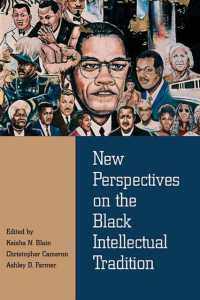- ホーム
- > 洋書
- > 英文書
- > Philosophy
Full Description
An important work by 20-century philosopher Hans Blumenberg, here translated into English for the first time, The Laughter of the Thracian Woman describes the reception history of an anecdote best known from Plato's Theaetetus dialogue: while focused on observing the stars, the early astronomer and proto-philosopher Thales of Miletus fails to see a well directly in his path and tumbles down. A Thracian servant girl laughs, amused that he sought to understand what was above him when he was not mindful of what was right in front of him.
Blumenberg sees the story as a highly sought substitute for our missing knowledge of the earliest historical events that would fit the label "theory." By retelling the anecdote, philosophers reveal their distinctive values regarding absorption in curiosity, philosophy's past, and the demand that theorists abide by sanctioned methods and procedures. In this work and others, Blumenberg demonstrates that philosophers' most beloved images and anecdotes have become indispensable to philosophy as metaphors; that is, as representations whose meanings remain indefinite and invite frequent reinterpretation.
Contents
Introduction: Reading into the Distance
About this book
I. Theory as exotic behavior
II. Socrates is shifted into protohistory
III. Knowledge about heaven and capability on earth
IV. The theorist between comedy and tragedy
V. Reoccupations
VI. Astrological predominance
VII. Applause and scorn from the moralists
VIII. As adopted by historical critique
IX. From cursing sinners to scorn for the Creation
X. Tycho Brahe's coachman and the earthquake in Lisbon
XI. Absentmindednesses
XII. In what matter Thales had failed according to Nietzsche
XIII. How to recognize what matters
IVX. Interdisciplinarity as repetition of protohistory
Works Cited








